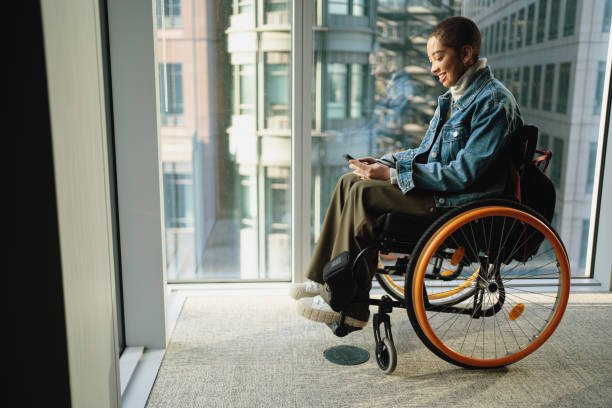Imagine facing the barriers of war, persecution, or disability, and then being offered a lifeline to study in the UK, fully funded. That is exactly what the Commonwealth Scholarships aim to provide for refugees and students living with disabilities.
The Commonwealth scholarships for refugee & disability Students are not just scholarships; they are powerful tools of inclusion and empowerment.
Whether you are seeking a second chance after displacement or overcoming physical limitations, these opportunities are designed to uplift and transform your future.
Let us break it down step by step so you do not miss your shot at this life-changing opportunity.
What Are Commonwealth Scholarships?

Commonwealth Scholarships are funded by the UK government to support students from low and middle-income countries in pursuing postgraduate degrees in the UK.
Over the years, the program has expanded to include equity-driven provisions for the following persons:
- Refugees and asylum seekers
- Students with physical or learning disabilities
- Internally displaced persons (IDPs)
These specialized tracks ensure that marginalized groups are not left behind in accessing world-class education.
Read also: Future Education Magazine’s Top Scholarships For 2025 Globally
Who Can Apply as a Refugee or Disabled Applicant?
To qualify under the refugee or disability-inclusive categories, you must meet the following eligibility criteria:
- You must be a citizen or have refugee status in a Commonwealth country
- You must hold a bachelor’s degree with upper second class (2:1) or equivalent
- You must be permanently or temporarily displaced due to conflict, disaster, or persecution
- You must provide verified documentation of your refugee or disability status
- You must not have studied for a year or more in a high-income country previously (exceptions may apply)
Applicants with disabilities may also be required to submit medical documentation confirming their condition and how it affects their access to education.
What Programs Are Covered by the Commonwealth Scholarships for Refugee & Disability Students?
You can apply to pursue a full-time Master’s degree in the UK in areas that contribute to development, such as the following:
- Public health and medicine
- Education and inclusive teaching
- Sustainable development and environmental management
- Conflict resolution and international law
- Technology and digital inclusion
The scholarship does not cover undergraduate programs or part-time/distance courses.
What Does the Commonwealth Scholarships for Refugee & Disability Students Cover?
Here is what successful applicants receive:
- Full tuition fees
- Airfare to and from the UK
- Monthly living allowance (approximately £1,347 to £1,652 per month)
- Disability support allowance (if applicable)
- Warm clothing and thesis grants
- Travel grants for study-related trips (if needed)
Additional support services are offered for students with visual, hearing, or mobility impairments.
How to Apply for the Commonwealth Scholarships for Refugee & Disability Students (Step-by-Step)
Here is how you can apply for a Commonwealth Scholarship under the refugee or disability route:
- Visit the Commonwealth Scholarship Commission website
- Register for an account and select the “Refugee or Disability-Inclusive” application track
- Submit your university application to one of the approved UK institutions
- Gather supporting documents: academic transcripts, references, passport, disability or refugee documentation
- Fill out and submit your Commonwealth Scholarship application online
- Monitor your email for interview invites or document clarification requests
Deadlines usually fall between September and December, depending on your home country and chosen university.
What are the Tips to Strengthen Your Application?
- Tell Your Story: Explain how displacement or disability has shaped your journey and goals
- Link Your Studies to Development: Show how your chosen program will contribute to your home country
- Secure Strong References: Preferably from lecturers or professionals familiar with your potential
- Be Clear and Honest: Especially when detailing your challenges and how you overcame them
Scholarship committees are not just looking for grades, but they are also looking for resilience, vision, and impact.
Some Success Stories & Real Impact
Over the years, Commonwealth Scholarships have transformed the lives of thousands of refugees and students with disabilities.
From wheelchair-bound environmental scientists to former asylum seekers who are now policymakers, these scholars are driving real change in their communities.
Many graduates return home to become health workers, education reformers, tech innovators, or even NGO founders. The ripple effect is immense, and you could be next.
Commonwealth Scholarships For Refugee & Disability Students (FAQs)
Can I Apply if I Am Currently Seeking Asylum?
Yes, as long as your refugee or asylum seeker status is officially recognized by a Commonwealth country, you are eligible to apply.
Do I Need to Secure University Admission First?
In most cases, yes. Some universities allow you to apply concurrently with your scholarship application, but early preparation is key.
Will My Disability Affect the Selection Process?
Not negatively. The scholarship is inclusive and prioritizes accessibility. Your application will be assessed based on merit and your potential impact.
Is IELTS or TOEFL Required?
Yes, most UK universities require an English language proficiency test. However, some may waive it depending on your academic background or origin country.
Can I Bring My Family to the UK if Selected?
Spouse and child allowances may be available, but this varies by university and should be confirmed during your application process.
Read also: How To Use SchooLinks & Similar Platforms To Find Scholarships
Conclusion
Whether you have been displaced by conflict or you are navigating life with a disability, your academic dreams are valid and still within reach.
The Commonwealth Scholarships for Refugee & Disability Students exist to open doors, not just for you, but for the communities you will eventually impact.
If you are reading this and thinking, “Maybe this is for me,” then do not wait. Start gathering your documents, drafting your statement, and taking that brave first step toward a brighter future.
